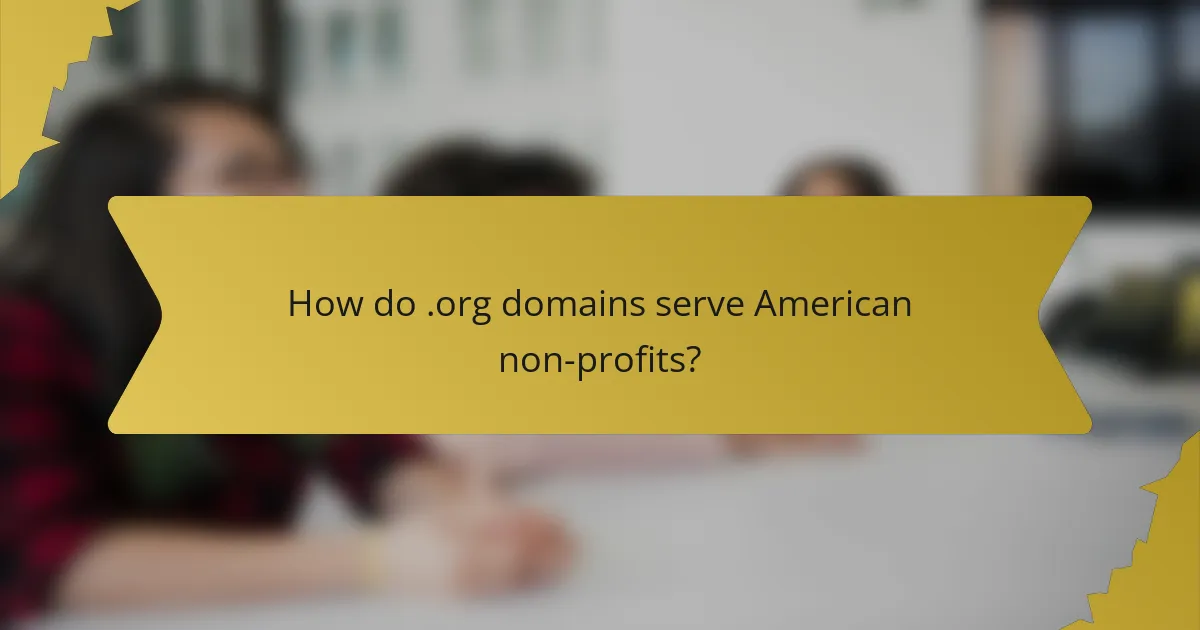For American businesses, choosing the right top-level domain (TLD) extension is crucial for establishing an online presence. Popular options such as .com, .org, .net, .biz, and .info each serve distinct purposes and can shape public perception. A .com domain, for instance, is widely recognized and trusted, while .org is tailored for non-profits, enhancing credibility and community engagement.

Which top-level domain extensions are most popular for American businesses?
The most popular top-level domain (TLD) extensions for American businesses include .com, .org, .net, .biz, and .info. Each of these extensions serves different purposes and can influence how a business is perceived online.
.com for commercial use
The .com extension is the most recognized and widely used TLD for commercial businesses in the United States. It conveys a sense of professionalism and credibility, making it the preferred choice for e-commerce and corporate websites.
When selecting a .com domain, ensure that the name is memorable and aligns with your brand. Avoid overly complex names to enhance user recall and searchability.
.org for non-profit organizations
The .org extension is primarily used by non-profit organizations, charities, and educational institutions. It signals a commitment to a cause or community service, which can foster trust among donors and volunteers.
Organizations using .org should focus on transparency and mission clarity in their website content. This helps to establish credibility and encourages engagement from supporters.
.net for network services
The .net extension is often associated with network services and infrastructure providers. While it is less common for general businesses, tech companies, internet service providers, and web hosting services frequently use it.
Choosing a .net domain can be beneficial if the desired .com version is unavailable. However, ensure that your branding clearly communicates your services to avoid confusion with .com competitors.
.biz for business purposes
The .biz extension is specifically designed for business use, particularly for small to medium enterprises. It can be a good alternative when .com domains are taken, offering a clear indication that the site is business-oriented.
While .biz can be effective, it is less recognized than .com. Businesses should invest in marketing efforts to build brand awareness and trust with this extension.
.info for informational sites
The .info extension is intended for informational websites, making it suitable for blogs, educational resources, and informational portals. It signals to users that the site is focused on providing knowledge rather than commercial transactions.
When using a .info domain, ensure that the content is valuable and well-organized. This helps attract visitors seeking information and can improve search engine visibility.

What are the benefits of using a .com domain?
A .com domain offers several advantages for American businesses, including widespread recognition, enhanced trust, and better search engine optimization (SEO) potential. These benefits can significantly impact a company’s online presence and credibility.
Global recognition
The .com domain is the most recognized top-level domain (TLD) worldwide. It has become synonymous with commercial activity, making it a preferred choice for businesses aiming to reach a global audience.
Using a .com domain can help your business stand out in a crowded marketplace. Customers often assume that a .com website is more established and legitimate compared to other TLDs.
Trust and credibility
Having a .com domain can enhance your business’s trustworthiness. Customers are generally more familiar with .com domains and may feel more secure when engaging with a website that uses this extension.
To build credibility, ensure that your branding aligns with your .com domain. Consistency in your domain name, business name, and marketing materials fosters a professional image.
SEO advantages
Search engines tend to favor .com domains, which can lead to better rankings in search results. While many factors influence SEO, having a .com domain can provide a slight edge in visibility.
To maximize SEO benefits, focus on creating quality content and optimizing your website’s structure. A .com domain, combined with effective SEO strategies, can drive more organic traffic to your site.

How do .org domains serve American non-profits?
.org domains are specifically designed for non-profit organizations, providing a trusted online presence that reflects their mission. These domains help establish credibility and foster a sense of community among supporters and stakeholders.
Non-profit branding
Using a .org domain can significantly enhance a non-profit’s branding efforts. It signals to visitors that the organization is dedicated to a cause rather than profit-making, which can attract like-minded individuals and partners. A strong brand identity is crucial for non-profits to differentiate themselves in a crowded marketplace.
For example, well-known organizations like the American Red Cross and World Wildlife Fund utilize .org domains, reinforcing their commitment to their missions. This branding choice can help non-profits convey professionalism and reliability.
Community trust
Community trust is vital for non-profits, and a .org domain can help build that trust. Many individuals associate .org with reputable organizations, which can lead to increased engagement and support. When potential donors see a .org, they may feel more confident in contributing to the cause.
To enhance trust further, non-profits should ensure their website is user-friendly and transparent about their operations and financials. Regular updates and clear communication can strengthen this trust over time.
Funding opportunities
Having a .org domain can open doors to various funding opportunities for American non-profits. Many grant-making organizations prefer to fund entities with .org domains, viewing them as more legitimate and mission-driven. This preference can lead to increased access to grants and donations.
Non-profits should actively seek out funding sources that align with their mission and ensure their online presence reflects their values. Additionally, they can leverage their .org status in grant applications to enhance their credibility and appeal to potential funders.

What factors should American businesses consider when choosing a domain extension?
American businesses should consider their target audience, business type, and the SEO implications of different domain extensions. Each factor plays a crucial role in establishing an online presence that resonates with customers and enhances visibility.
Target audience
Understanding the target audience is essential when selecting a domain extension. For instance, if a business primarily serves local customers, a .us extension could reinforce its American identity. Conversely, a global audience might benefit more from a .com or .net extension, which are widely recognized and trusted internationally.
Additionally, businesses targeting specific sectors may consider industry-specific extensions like .tech for technology firms or .shop for e-commerce. This can help convey professionalism and relevance to potential customers.
Business type
The type of business significantly influences the choice of domain extension. For example, non-profit organizations often use .org, while educational institutions might opt for .edu. These extensions can enhance credibility and signal the nature of the organization to users.
Small businesses and startups frequently choose .com due to its familiarity and perceived authority. However, niche businesses may find success with newer extensions like .co or .io, which can help differentiate them in competitive markets.
SEO implications
Domain extensions can impact search engine optimization (SEO) strategies. While the extension itself does not directly affect rankings, user perception and click-through rates can be influenced by familiarity with certain domains. For example, .com domains are often preferred by users, which can lead to higher traffic.
Moreover, local extensions like .us may provide a slight advantage in local search results, helping businesses appear more relevant to regional customers. It’s essential to balance the choice of extension with overall SEO strategies, including keyword optimization and quality content.

How do regional domain extensions impact American businesses?
Regional domain extensions can significantly influence American businesses by enhancing local identity and trust among consumers. Utilizing these extensions helps businesses connect with their target audience more effectively, fostering a sense of community and reliability.
.us for local branding
The .us domain extension serves as a powerful tool for local branding in the United States. It signals to customers that a business is American, which can enhance its appeal to local consumers. This is particularly beneficial for small businesses aiming to establish a strong community presence.
For example, a bakery in Chicago using a .us domain can attract customers who prefer to support local establishments. Additionally, having a .us extension can improve search engine visibility for local queries, making it easier for potential customers to find the business online.
Regional trust signals
Using regional domain extensions like .us can act as a trust signal for American consumers. Customers are often more likely to engage with businesses that display a commitment to local values and standards. This trust can lead to higher conversion rates and customer loyalty.
Moreover, businesses that utilize .us domains may benefit from perceived legitimacy, as consumers often associate these domains with local regulations and quality standards. This perception can be especially crucial in industries like food and healthcare, where trust is paramount.
Market differentiation
Regional domain extensions can help American businesses differentiate themselves in a crowded market. By choosing a .us domain, companies can stand out from competitors using more generic extensions like .com or .net. This distinction can be particularly advantageous in niche markets.
For instance, a tech startup focused on local solutions might find that a .us domain resonates more with its target audience than a standard domain. This differentiation not only enhances brand identity but also aligns the business more closely with local consumer preferences and values.

What are emerging trends in domain extensions for American businesses?
Emerging trends in domain extensions for American businesses include the rise of new generic top-level domains (gTLDs) that cater to specific industries and interests. These extensions allow companies to better align their online presence with their brand identity and target audience.
New gTLDs for niche markets
New gTLDs are designed to serve niche markets, providing businesses with more relevant options for their web addresses. For instance, extensions like .tech, .design, and .shop allow companies to communicate their industry focus directly in their domain name.
When choosing a new gTLD, consider how well it reflects your brand and resonates with your target customers. A well-chosen gTLD can enhance your marketing efforts and improve search engine visibility. However, be cautious of overly obscure extensions that may confuse potential visitors.
Examples of successful niche gTLDs include .photography for photographers and .cafe for coffee shops. These extensions not only clarify the business type but also create a memorable online identity that can attract the right audience.
